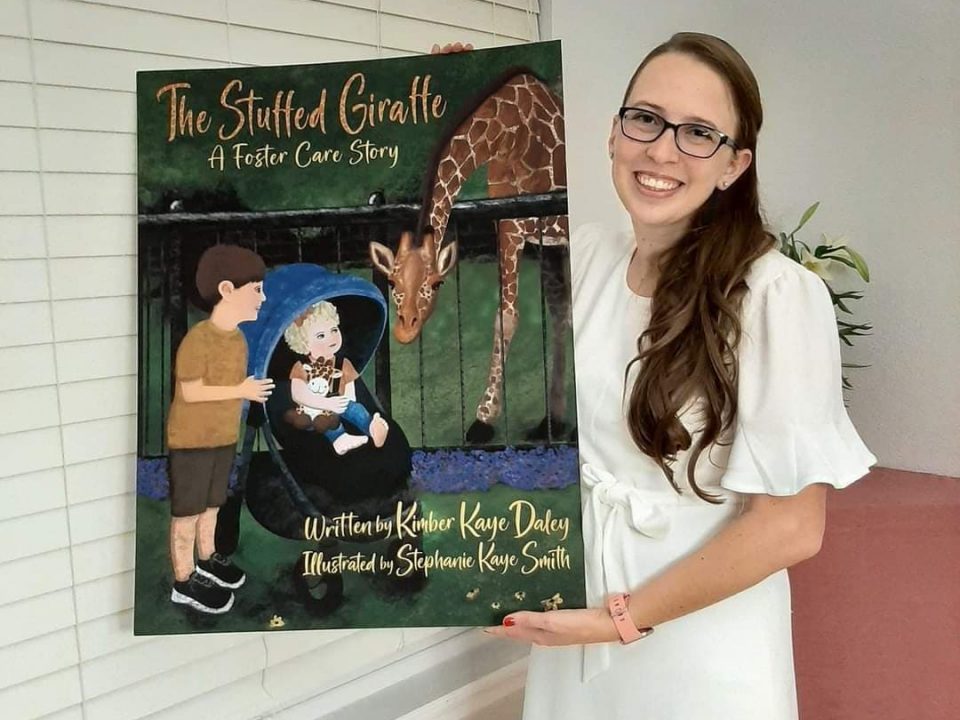
An Interview with Room at the Table Author Justin Vaughn
I was recently out to eat for breakfast with my family, and a sign on the wall of the restaurant said, “When you have more than you need, build a longer TABLE, not a higher fence.” I thought of foster families, who are doing just that – making room in their homes for children in need. Released in June of 2020, Justin Vaughn’s Room at the Table, tells the story of the Watsons, a fictional family who shares their life with a little boy named Joshua. Through their story, we learn that making room at our tables can be challenging, but that it also blesses our lives. Below, Vaughn, an educator, dad, foster dad, and author, shares with us what inspired this story and how we can learn from it.

What inspired you to write a book about foster care?
I have been an early childhood teacher for ten years. Something that I have noticed during my time in the classroom is that children long to be represented in the books they read. Children want to be able to identify with a character in a story and to be proud of the character that they related to. Foster care and adoption are topics that are lightly covered in children’s literature but it isn’t expansive and it is not as common as other topics. I believe the reason for this is because it’s heavy. The topic can be difficult to explain and it can be hard for children to understand. In this book, I sought to create a story that would connect to readers in a special way. I hoped to build empathy in children that have never experienced foster care and adoption and I hoped to give a voice to children that have experienced those events in their lives.
During the course of your book, Joshua and the Watsons experience many of the stages that a family might experience during a foster care placement. What do you hope people will learn from reading about each of these stages?
I hope that when people read this book, they will see that foster care is a special call. It’s not perfect, and it’s certainly not easy. It’s messy, and it’s hard, AND it’s worth it. The best things in life come with work, determination, and patience. We need so much grace along the way. I hope that individuals that read Room at the Table will see the tremendous impact that a single family can have on the life of a child. Stepping out of our own comfort zone and loving unconditionally can change a child’s life forever.
One thing I loved about the book was how special teachers – Ms. Bell, Mr. Tomkins, and Mr. Whitmire – played important roles in Joshua’s life. Could you explain a little about why you chose each of these characters for the book?
As a teacher, I believe that this profession contains many of the unsung heroes of our community. Teachers spend their days and nights thinking of their students and always wanting the best for them. It was important to me that I included these characters to give honor to the teachers working their hardest day and night to give of themselves for the love of their students. I also hoped that it would give teachers a glimpse of how impactful their profession really is on all of their students. Sometimes, we say and do things in the classroom that we don’t even know have a huge impact on our students. I hoped that by introducing these characters, it would give the readers a glimpse into the love inside a teacher’s heart.
Another important element of the story is Joshua’s relationship with his mother, Kacey. What would you like people to understand about a foster family’s relationship with the biological parents?
When I wrote Room at the Table, I spent a lot of time thinking about the different stories I’ve experienced with my own foster children and the stories that I’ve heard of others’ experiences. The truth is, every fostering story looks different. Sometimes, children see their biological families on visits for a period of time until they can become fully restored and healed. Sometimes, children have no further contact with their biological families because the healing just can’t take place. And in some beautiful instances, foster families are able to build and maintain a relationship with the biological families of the children in their care. The reason that I chose to place an emphasis on this scenario in Room at the Table is because I wanted to give children in foster care a glimpse into the hope that can come out of their situation. It doesn’t always work out this way, but I think it’s important to give a message of hope in any situation that seems hopeless. One way or the other, there are people that are ready to love these kids with all of their hearts. In Joshua’s situation, I wrote Kacey’s story in a way that showed her desire to love her son to the best of her ability but also her brave choice to share that experience with another family.
I really liked how the book ended with the Watsons choosing to foster another child. Why did you decide to end it that way?
The reason that I chose this ending is because I believe that fostering changes you. It’s an ever-evolving process. It can be painful and joyful, tearful and triumphant. I feel like the ending of this book gives a further message of hope. Hope that new days are ahead. Hope that families will continue to step in to love these vulnerable children. Hope that every child’s story will include the love of family. In the end, it’s all about hope.

What advice can you give to someone who is considering foster care?
To anyone that is considering foster care, I would say seek out relationships with others that have fostered. Don’t be afraid to ask questions and learn. This is a learning process for all of us! There is such a wonderful intrinsic reward knowing that you have stepped in and loved a child that needs stability and love. It’s really quite special. There will be difficult days but there will be so many heartfelt moments, too! I would do it all over again and will continue to do so! Find a community of other like-minded individuals that are seeking to help children too. Having a support group will help you go the distance!
Interested in becoming a foster parent or getting involved? Learn more by exploring Fostering Great Ideas’ programs including Care2Foster. Our staff would love to connect with you and help you to find resources in your area. Email [email protected] if you’d like to chat with our team.
What advice can you give to the someone who knows a family that is fostering?
Not everyone is called to foster. But I truly believe that EVERYONE is called to care for those in foster care. This can be done directly or indirectly. If you know someone that fosters, try offering a home cooked meal for the family when they accept a new placement. Seek out opportunities to donate items to foster closets in your county. Offer to babysit from time to time to give the family a moment to breathe and reflect. Every little gesture really feels like a BIG gesture when you are on the other side of the scenario. Foster parents are rock stars but they could always use a loving hand to help out.
Is there anything else you would you like to add?

My wife and I have been foster parents since 2015, and we have fostered ages 10 months to 10 years. My wife and I also coordinate a foster and adoptive resource center in Hardeeville, SC, called Creative’s Closet. This resource is available to all foster families in Jasper, Colleton, and Beaufort Counties.
Additionally, I am trying to get the word out about my author website at www.justinvaughn.com . Make sure to check it out as a new announcement is coming about my brand-new picture book!



